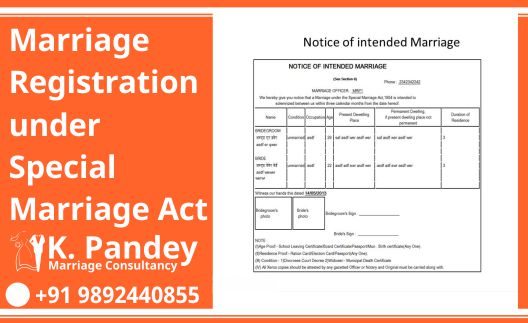Marriage Registration under Special Marriage Act

The Special Marriage Act 1954 of India is an integral legal framework that plays a pivotal role in shaping its marital landscape. This Act stands as an embodiment of secularism and unity, providing couples a means of wedlock regardless of religious affiliations or backgrounds. Here, we explore its key characteristics as well as its implication for Indian law and society at large. This act governs Marriage Registration under Special Marriage Act
in Mumbai.
What Is the Special Marriage Act and Its Significance?
The Special Marriage Act of 1954 is an important piece of legislation that empowers individuals to solemnize their marriage without recourse to religious rituals or ceremonies, in keeping with secularist ideals, unity, and the belief that love transcends religious borders. It recognizes individual freedom of choice and the right of couples to marry whomever they love regardless of differences such as faith, caste, or creed.
Marriage is more than a deeply personal and emotional commitment; it also has wide-ranging legal and societal ramifications. Registering one’s marriage under the Special Marriage Act not only formalizes it legally but provides several rights and privileges, such as inheritance rights, government benefits access, and joint ownership rights of property.
About the Special Marriage Act.
India’s Special Marriage Act of 1954 is a legal framework designed to facilitate the solemnization and registration of marriages. We explore its details here – its purpose, scope, significance as a secular alternative for wedding ceremonies, etc.
The Special Marriage Act 1954 is an innovative piece of legislation that is vital in regulating marriages in India. This Act caters to couples of various religious, cultural, and ethnic backgrounds by offering them an inclusive platform on which they can celebrate their union without religious restrictions or boundaries limiting celebration. Instead of traditional religious ceremonies focusing on spiritual practices alone, this Act instead focuses on legal aspects alone for an inclusive marriage choice.
The Special Marriage Act’s primary aim is to provide an open and equitable approach to marriage for individuals looking for one unfettered by religious rituals or customs. It recognizes personal choice and freedom while protecting such unions under Indian law.
Secular and non-religious marriage ceremonies play an invaluable role for couples looking to prioritize commitment over religion. By choosing secular marriage ceremonies, couples can celebrate their union without incurring religious obligations – making their union accessible to people from all walks of life.
Applicability to All Indian Citizens: One of the key features of the Special Marriage Act is its universal applicability, making its provisions accessible to all Indian citizens regardless of religion, ethnicity, or background. This fosters values like diversity, choice, and unity within our nation.
How to apply for Marriage Registration under Special Marriage Act?
Step 1: Give Notice of Your Intention to Marry
The first step is for the couple to tell the Marriage Registrar that they want to get married. This notice needs to be sent in the manner that is specified.
The notice should have information about both partners, like their names, ages, homes, and jobs.
Describe the area where you want to get married, as the letter is usually sent to the Marriage Registrar of that area.
Step 2: Putting the notice out there
Once the notice is turned in, it is generally posted or published in the office of the Marriage Registrar.
The point of this book is to give people who have good reasons to complain a chance to do so. Most of the time, the warning stays up for 30 days.
Step 3: Complaints and an investigation
The Marriage Registrar will go ahead with the registration of the marriage if no legal objections are raised within the time limit.
Should objections be made, they will be looked into, and the Marriage Registrar will decide if they are true or not.
Step 4: Look Good in Person
For the registration, both people must show up in person at the office of the Marriage Registrar on the date given.
Today is the day that the marriage is officially registered.
Step 5: The ceremony of registration
The filing takes place at the office of the Marriage Registrar. The event is easy and safe.
Both people are getting married, and three witnesses must be present at the service.
The wedding record is signed by the couple and two witnesses. This is a very important step for making the marriage legal.
Step 6: Getting the marriage license
The Marriage Registrar gives out a marriage certificate after the service. You can use this paper as proof that you are legally married.
Eligibility for the Marriage Registration under Special Marriage Act
The Special Marriage Act 1954 has been designed to accommodate couples from diverse backgrounds. It offers an alternative path for marriage that transcends religion, caste, and creed restrictions. Here’s an explanation of the eligibility criteria for couples to marry under this Act:
- Minimum Age: To marry under the Special Marriage Act, both partners must meet the legal minimum marriageable age requirements, which for men is 21 and 18 for females.Sound Mind: Both individuals must possess sound minds at the time of marriage in order to fully grasp all its implications and be capable of making informed decisions regarding what may lie ahead in terms of commitment and partnership.
- Voluntary Consent: Voluntary consent is a basic principle in marriage; both parties must freely and without external pressure or coercion agree to enter the marriage relationship.
- No Existing Marriage: At the time of marriage, neither party should have an existing marriage to be considered valid; if either has been previously married, they should present either their divorce decree or death certificate from their former partner as evidence.
- Avoid Prohibited Relationships: The Act sets forth certain levels of relationships that preclude marriage; couples should make sure not to fall within these prohibited degrees.
- Give Notice of Marriage: Both parties should give notice to the Marriage Officer (Registrar) in their district where at least one has lived for at least 30 days immediately before giving their notice of marriage.
- Objections: After the notice has been published, anyone may raise objections if they believe it violates any provisions of the Marriage Act. These objections will then be reviewed by a Marriage Officer.
Documents required for the bride and groom in Mumbai
- Application Form:Couples need to complete and sign the application form provided by the marriage registrar.
- Proof of Age:Documents verifying the date of birth of both individuals, such as birth certificates or educational certificates, are typically required.
- Proof of Residence:Documents like voter ID, Aadhar card, passport, or utility bills that establish the place of residence for both individuals.
- Passport-sized Photographs:Recent passport-sized photographs of both partners, which will be affixed to the marriage registration form.
- Affidavit:A sworn affidavit stating the individuals’ eligibility for marriage and confirming that they are not related within the prohibited degrees of relationships.
- Witnesses:The presence of three witnesses is generally required during the marriage registration process. Each witness should provide identification documents.
- Marriage Invitation Card:A copy of the marriage invitation card, if available, can be helpful.
- Divorce Decree Absolute or Death Certificate (if applicable):If either partner has been previously married and is now divorced or widowed, the relevant documents, such as the divorce decree absolute or the death certificate of the former spouse, should be provided.
Documents required for three witnesses
To be a witness at a court marriage in Mumbai, you need these documents:
- Identity Proof: Use a government-issued ID like Aadhar card, passport, voter ID, or driver’s license to prove who you are.
- Residence Proof: Show something that proves where you live, like utility bills (electricity, water, gas) or a rental agreement.
- Passport-sized Photographs: You might have to give a few small photos of yourself.
- Age Proof: Sometimes, the Marriage Registrar might ask for proof of your age, like a birth certificate, school leaving certificate, or passport.
FAQ for you..!
FAQ for Marriage Registration under Special Marriage Act:
What Is the Special Marriage Act 1954?
In India, the Special Marriage Act provides couples from different religious or cultural backgrounds the ability to legally wed in an interfaith ceremony that does not incorporate any religious elements.
Who Can Marry Under the Special Marriage Act 1954?
Any Indian citizen may marry under this Act regardless of religion or caste.
What are the advantages of marrying under the Special Marriage Act?
They include legal recognition, inheritance rights, and social acceptance – in addition to being able to marry without changing one’s religion.
What are the eligibility requirements for marriage under this Act?
According to this Act, both individuals must be of legal marriageable age and should not currently have any living spouse.
What documents are needed to register under the Special Marriage Act?
Typically, documents required include proof of age, residency, and a photograph. As specifics may differ depending on where your wedding takes place, it is advisable to check with local authorities.
Under this Act, is it required to publish notice of intended marriage in a newspaper?
Yes. Publicizing notice allows any interested parties to lodge any possible objections.
Do both partners typically need to be present during the marriage registration process?
Yes, both partners usually need to be present during this step of registration.
How long will the registration process typically take?
Registration processes vary, but in general, they are more efficient than traditional ceremonies and can often be concluded within weeks.
Can foreign nationals marry under the Special Marriage Act?
Yes, foreign nationals can also take advantage of this Act to get married, though additional documentation may be needed for legal compliance purposes.
What are the differences between marriages conducted under the Special Marriage Act and religious marriages?
One key difference between Special Marriage Act marriages and religious ones is that non-religious marriages allow more flexibility when it comes to rituals and ceremonies, whereas religious marriages adhere to specific customs and traditions associated with their faith.








Latest Blogs
